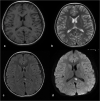A cohort study of mild encephalitis/encephalopathy with a reversible splenial lesion in children
- PMID: 34333864
- PMCID: PMC8413819
- DOI: 10.1002/brb3.2306
A cohort study of mild encephalitis/encephalopathy with a reversible splenial lesion in children
Abstract
To investigate the clinical features, imaging features, and prognosis of mild encephalitis/encephalopathy with a reversible splenial lesion (MERS) in children METHODS: The clinical and imaging data of a cohort of 28 children diagnosed as MERS from January 2019 to October 2020 were retrospectively analyzed RESULTS: Of the 28 patients, 17 were males and 11 were females. The onset age ranged from 8 months to 12 years old, with an average age of 4 years and 2 months. All children developed normally before onset, and three of them had a history of febrile convulsion. More than half of the patients (62.9%) had preceding infections of gastrointestinal tract. All the cases developed seizures, and most (71.4%) had more than one time. Other neurological symptoms included dizziness/headache, consciousness disorder, limb weakness, blurred vision, and dysarthria. Cranial magnetic resonance imaging (MRI) showed lesions in the splenium of the corpus callosum in all, extending to other areas of the corpus callosum, bilateral semi-ovoid center, and adjacent periventricular in two cases. The clinical symptoms were relieved after steroids, intravenous immunogloblin, and symptomatic treatment, without abnormal neurodevelopment during the followed-up (2 months-2 years). Complete resolution of the lesions was observed 8-60 days after the initial MRI examinations CONCLUSION: MERS in children is related to prodromal infection mostly, with a wide spectrum of neurologic symptoms, characteristic MRI manifestations, and good prognosis.
Keywords: child; magnetic resonance imaging; mild encephalitis/encephalopathy with a reversible splenial lesion (MRES).
© 2021 The Authors. Brain and Behavior published by Wiley Periodicals LLC.
Conflict of interest statement
The authors declare no conflict of interest.
Figures


Similar articles
-
[Clinical features of mild encephalitis/encephalopathy with a reversible splenial lesion in children].Zhongguo Dang Dai Er Ke Za Zhi. 2016 Dec;18(12):1291-1295. doi: 10.7499/j.issn.1008-8830.2016.12.019. Zhongguo Dang Dai Er Ke Za Zhi. 2016. PMID: 27974125 Free PMC article. Chinese.
-
Mild encephalitis/encephalopathy with a reversible splenial lesion associated with systemic Mycoplasma pneumoniae infection in North America: a case report.J Med Case Rep. 2022 Feb 20;16(1):74. doi: 10.1186/s13256-022-03299-6. J Med Case Rep. 2022. PMID: 35183255 Free PMC article.
-
Mild encephalitis/encephalopathy with a reversible splenial lesion in children.Diagn Interv Radiol. 2018 Mar-Apr;24(2):108-112. doi: 10.5152/dir.2018.17319. Diagn Interv Radiol. 2018. PMID: 29757148 Free PMC article.
-
[Clinically mild encephalitis/encephalopathy with a reversible splenial lesion of corpus callosum in a child and literature review].Zhonghua Er Ke Za Zhi. 2014 Mar;52(3):218-22. Zhonghua Er Ke Za Zhi. 2014. PMID: 24824394 Review. Chinese.
-
[Kawasaki disease complicated with mild encephalitis/encephalopathy with a reversible splenial lesion: A case report and literature review].Beijing Da Xue Xue Bao Yi Xue Ban. 2022 Aug 18;54(4):756-761. doi: 10.19723/j.issn.1671-167X.2022.04.028. Beijing Da Xue Xue Bao Yi Xue Ban. 2022. PMID: 35950404 Free PMC article. Review. Chinese.
Cited by
-
Case of clinically mild encephalitis/encephalopathy with a reversible splenial lesion (MERS) due to Legionella pneumonia.BMJ Case Rep. 2022 Dec 30;15(12):e252994. doi: 10.1136/bcr-2022-252994. BMJ Case Rep. 2022. PMID: 36585049 Free PMC article.
-
Clinical Variability of Pediatric MERS: Insights from a Retrospective Observational Study.J Clin Med. 2025 Jun 12;14(12):4169. doi: 10.3390/jcm14124169. J Clin Med. 2025. PMID: 40565916 Free PMC article.
-
Reversible splenial lesion syndrome in children: a retrospective study of 130 cases.Front Neurol. 2023 Sep 5;14:1241549. doi: 10.3389/fneur.2023.1241549. eCollection 2023. Front Neurol. 2023. PMID: 37731857 Free PMC article.
-
Mild Encephalopathy With Reversible Splenial Lesion (MERS) in a Child With Influenza.Cureus. 2023 Dec 20;15(12):e50838. doi: 10.7759/cureus.50838. eCollection 2023 Dec. Cureus. 2023. PMID: 38249260 Free PMC article.
References
-
- Abenhaim Halpern, L., Agyeman, P., Steinlin, M., El‐Koussy, M., & Grunt, S. (2013). Mild encephalopathy with splenial lesion and parainfluenza virus infection. Pediatric Neurology, 48(3), 252–254. - PubMed
-
- Chen, F., Sun, S., Li, R., Du, Y., & Tang, H. (2020). Clinical analysis of children with mild encephalitis with reversible lesion of corpus callosum (report of 16 cases and literature review). Chinese Journal of Clinical Neuroscience, 28(2), 196–202.
-
- Chen, W. X., Liu, H. S., Yang, S. D., Zeng, S. H., Gao, Y. Y., Du, Z. H., Li, X. J., Lin, H. S., Liang, H. C., & Mai, J N. (2016). Reversible splenial lesion syndrome in children: Retrospective study and summary of case series. Brain & Development, 38(10), 915–927. - PubMed
-
- Dong, Y., Guo, A., Liu, L., Wang, Y., Chen, N., & Li, J. (2017). Clinical study of mild encephalitis/encephalopathy with reversible splenial lesions in children. Chinese Pediatric Emergency Medicine, 24(9), 709–712.
Publication types
MeSH terms
LinkOut - more resources
Full Text Sources
Medical

